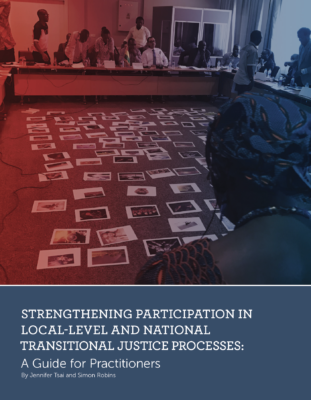 Transitional justice describes a range of strategies that are intended to respond to a period of systematic or widespread human rights violations, and promote accountability, reconciliation, truth, memorialization and, ultimately, peace. Typically, transitional justice strategies have focused on national mechanisms, such as criminal prosecutions of perpetrators of human rights violations; truth commissions that investigate past abuses and provide recommendations to address them; reparations to compensate material and moral damage suffered; memorials that preserve public memory of human rights violations and their victims; and institutional reforms designed to address the root causes of abuses.
Transitional justice describes a range of strategies that are intended to respond to a period of systematic or widespread human rights violations, and promote accountability, reconciliation, truth, memorialization and, ultimately, peace. Typically, transitional justice strategies have focused on national mechanisms, such as criminal prosecutions of perpetrators of human rights violations; truth commissions that investigate past abuses and provide recommendations to address them; reparations to compensate material and moral damage suffered; memorials that preserve public memory of human rights violations and their victims; and institutional reforms designed to address the root causes of abuses.
In reality, many national mechanisms tend to exclude poorer and more marginalized citizens, due to a number of shortcomings such as the influence of politics in these spaces, a lack of political will, institutional constraints and timing difficulties. These challenges attest to the complexities of designing and implementing inclusive, participatory transitional justice processes. In the absence of national mechanisms that foster meaningful participation, or when these processes are delayed, local-level processes often develop to fill the vacuum left by national or international mechanisms. Local-level processes may create opportunities for communities to participate in their design and implementation, and also serve as a stepping stone to community participation in national and, even international, processes.
The Global Initiative for Justice, Truth and Reconciliation’s 2018 publication, Strengthening Participation in Local-level and National Transitional Justice Processes: A Guide for Practitioners, is a comprehensive guide for civil society organizations, activists and policy practitioners who are working to engage victims more fully in transitional justice processes at the national and local levels.
To access the toolkit, please click here.
